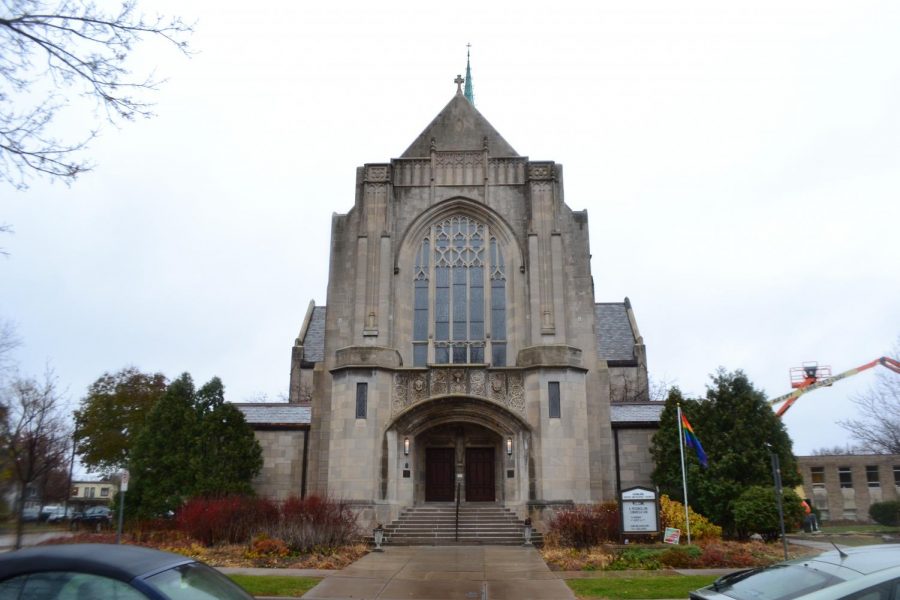Paving the Way Forward
Learn how the United Methodist Church seeks to solve disputes on sexuality, and what it could mean for Hamline.
An LGBTQIA+ pride flag waves in front of Hamline Church United Methodist.
November 13, 2018
For decades, Hamline’s affiliated denomination, the United Methodist Church (UMC), has wallowed in controversy over doctrinal differences on human sexuality. In 1972, a phrase was added to the UMC’s Book of Discipline stating that “The United Methodist Church does not condone the practice of homosexuality and considers this practice incompatible with Christian teaching.” Contrary to what this statement may imply, however, the United Methodist Church remains far from united on this issue. The Reconciling movement, of which Hamline Church has been a part since 1999, seeks to affirm LGBTQIA+ individuals to full inclusion in the church, and many congregations have performed same-sex weddings and ordained LGBTQIA+ clergy.
In an effort to reach a consensus on the extent to which the denomination can differ on sexuality issues and still remain whole, a special session of the normally quadrennial General Conference, the UMC’s main legislative forum, has been scheduled for Feb. 2019. A 32-member group dubbed “Commission on a Way Forward” was assembled to create plans for presentation and voting at General Conference. General Conference is a diverse voting body hundreds of members strong, consisting of both clergy and laypeople.
“There would be representatives from all continents,” University Chaplain Nancy Victorin-Vangerud said. “There would be representatives of various diverse movements in the Methodist church.”
The three main plans drawn up by the members of the Way Forward are the One-Church Plan, which removes the aforementioned quote from the Book of Discipline while emphasizing that individual churches can agree to disagree on sexuality matters; the Connectional Conferences Model, which would replace the UMC’s jurisdictional conferences based on geography with conferences defined by their position on homosexuality; and the Traditionalist Model, which affirms the current stance against homosexuality in the Book of Discipline and would mean increased enforcement of the statement for congregations who diverge from this belief.
“Unfortunately, from my perspective, there’s not a fourth option,” Victorin-Vangerud said. “[I would] rather that we have a progressive model on the table.That would entail that we would take out the discriminatory language, that we would be able to affirm the full inclusion of LGBTQ people into all areas of church leadership and… be able to marry, to give the sacraments, to baptize children… One’s sexual identity or one’s gender identity would not be ‘you’re either in or you’re out.’”
Kristin Mapel Bloomberg, Professor of Women’s Studies, emphasized the uncertainty surrounding which plan will have the votes to pass at General Conference.
“Oh, something’s going to get resolved, the question is, in which direction,” Mapel Bloomberg said.
Mapel Bloomberg, a conflicted United Methodist, left her home church several years back due to issues of misogyny and sexism at the hands of high-ranking members.
“I am holding the entire United Methodist Church as a whole in abeyance until I decide if it is worth me continuing to be a member of this organization, and I’m waiting to see what happens in February,” Mapel Bloomberg said. “There sometimes comes a time in the life of a large institution where it cannot sustain itself within the culture as it is currently constructed. I strongly think the United Methodist Church may have reached that point… I do not [support the One-Church Plan]. I understand the hopeful aspirations of attempting to hold together unity and diversity, but when that diversity comes at the expense of the humanity of a group of people, I cannot support that. I don’t know if what I favor would be considered progressive. Because honestly, burn it all down… I don’t think [the UMC] can recover.”
Mapel Bloomberg lambasted the conservative Good News movement within the church, which favors the Traditionalist Model.
“The Good News people, and the other extremely conservative folks, have worked for a very long time, and very hard, to make sure that so-called progressive issues… I don’t think they’re progressive, I think they’re humanitarian issues, became so highly politicized that the goal no longer became making disciples of the world.”
She went on to say that the church structure has become individualistic and selfish, and accused it of turning people into politics.
Senior Walker Brault, an alternate lay delegate to General Conference, favored a more pragmatic approach.
“Of the three plans put forward by the Way Forward, I think I would most back the One-Church Plan. I, in theory, would like the Connectional Conference[s Model] more,” Brault said. “however… The flexibility that it would give, I think, is more desirable and would be more beneficial than what would occur with the One-Church Model.”
Brault acknowledged that the Connectional Conferences Model was considered unlikely to pass due to the numerous changes to the UMC’s constitution, as well as to the structure of church conferences, its implementation would require — a viewpoint shared by Rev. Mariah Tollgaard of Hamline Church and Victorin-Vangerud. However, he felt that the One-Church Plan would provoke large-scale exodus of churches, both conservative and progressive, from the denomination, or perhaps even lead to a formal split.
“We don’t know what the terms of schism would look like,” Tollgaard said of the possibility of a split. “It’s just hard to know if the sort of core identity of United Methodism remains intact… [Hamline U]niversity, I imagine, would land on the side of inclusion, much the same as this church would.”


